too…to…结构用法解析
too to 的用法

To…to的用法一、too…to…结构表示否定含义表示否定意义,在翻译时,通常可译为“太……而不能……”、“太……无法……”。
常用的句型有五种。
1.“主语(人)+谓语动词+too+形容词/ 副词+to do sth.”这个句型是too...to结构最基本的常用句型。
主语是动词不定式的执行者,too后接形容词或副词原级,有时too后也可跟一个起形容词作用的过去分词,to后接动词原形。
如:The boy is too young to go to school. 这男孩年龄太小,不能上学。
He walks too slowly to get there on time. 他走得太慢,不能按时到达那儿。
2.“主语(物)+谓语动词+too+形容词/ 副词+ to do ”这个句型也是too...to结构最基本的常用句型。
主语是动词不定式的承受者,此时用主动式表示被动涵义。
在这个句型中,句子的主语和不定式的宾语是指同一个事物,则宾语不能重复,必须省掉。
如:The hat is too large to wear. 这帽子太大,没法戴。
The tea is too hot to drink. 茶太热,不能喝3.“主语(物)+谓语动词+too+形容词/ 副词+ to be done”,这是“too...to”结构中主语是不定式动作的承受者,动词不定式用被动式,后不能带宾语。
如:The tea is too hot to be drunk.茶太热,不能喝。
The shoes are too badly broken to be mended.这些鞋子破烂得不能修补。
4.当句子的主语与动词不定式的逻辑主语不一样时,要用句型“主语+谓语动词+too+形容词/ 副词+for sb +to do ”,在这个句型中,句子主语和不定式的宾语是指同一个事物,则宾语不能重复,必须省掉。
如果句子的主语是物时,for sb.可以省略,并不会影响句子否定意义的表达。
too。。。to的用法
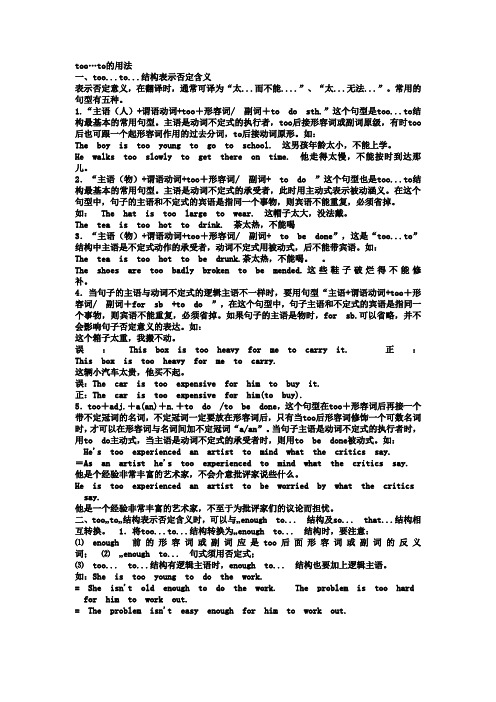
too…to的用法一、too...to...结构表示否定含义表示否定意义,在翻译时,通常可译为“太...而不能....”、“太...无法...”。
常用的句型有五种。
1.“主语(人)+谓语动词+too+形容词/ 副词+to do sth.”这个句型是too...to结构最基本的常用句型。
主语是动词不定式的执行者,too后接形容词或副词原级,有时too 后也可跟一个起形容词作用的过去分词,to后接动词原形。
如:The boy is too young to go to school. 这男孩年龄太小,不能上学。
He walks too slowly to get there on time. 他走得太慢,不能按时到达那儿。
2.“主语(物)+谓语动词+too+形容词/ 副词+ to do ”这个句型也是too...to结构最基本的常用句型。
主语是动词不定式的承受者,此时用主动式表示被动涵义。
在这个句型中,句子的主语和不定式的宾语是指同一个事物,则宾语不能重复,必须省掉。
如:The hat is too large to wear. 这帽子太大,没法戴。
The tea is too hot to drink. 茶太热,不能喝3.“主语(物)+谓语动词+too+形容词/ 副词+ to be done”,这是“too...to”结构中主语是不定式动作的承受者,动词不定式用被动式,后不能带宾语。
如:The tea is too hot to be drunk.茶太热,不能喝。
The shoes are too badly broken to be mended.这些鞋子破烂得不能修补。
4.当句子的主语与动词不定式的逻辑主语不一样时,要用句型“主语+谓语动词+too+形容词/ 副词+for sb +to do ”,在这个句型中,句子主语和不定式的宾语是指同一个事物,则宾语不能重复,必须省掉。
如果句子的主语是物时,for sb.可以省略,并不会影响句子否定意义的表达。
too…to的三种用法
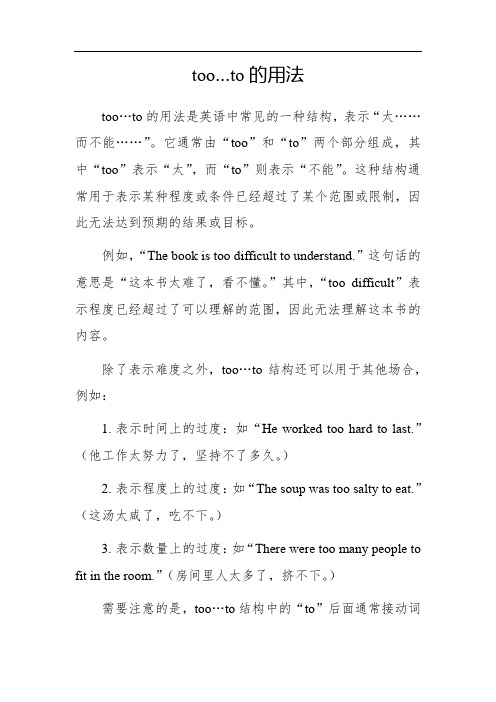
too…to的用法
too…to的用法是英语中常见的一种结构,表示“太……而不能……”。
它通常由“too”和“to”两个部分组成,其中“too”表示“太”,而“to”则表示“不能”。
这种结构通常用于表示某种程度或条件已经超过了某个范围或限制,因此无法达到预期的结果或目标。
例如,“The book is too difficult to understand.”这句话的意思是“这本书太难了,看不懂。
”其中,“too difficult”表示程度已经超过了可以理解的范围,因此无法理解这本书的内容。
除了表示难度之外,too…to结构还可以用于其他场合,例如:
1.表示时间上的过度:如“He worked too hard to last.”(他工作太努力了,坚持不了多久。
)
2.表示程度上的过度:如“The soup was too salty to eat.”(这汤太咸了,吃不下。
)
3.表示数量上的过度:如“There were too many people to fit in the room.”(房间里人太多了,挤不下。
)
需要注意的是,too…to结构中的“to”后面通常接动词
原形,表示无法达到预期的结果或目标。
此外,如果句子中有否定词“not”,则可以与too…to结构连用,表示“太……而不能不……”。
例如:“The movie was not too boring to watch.”(这部电影不太无聊,值得一看。
)。
“too...to”结构的用法剖析
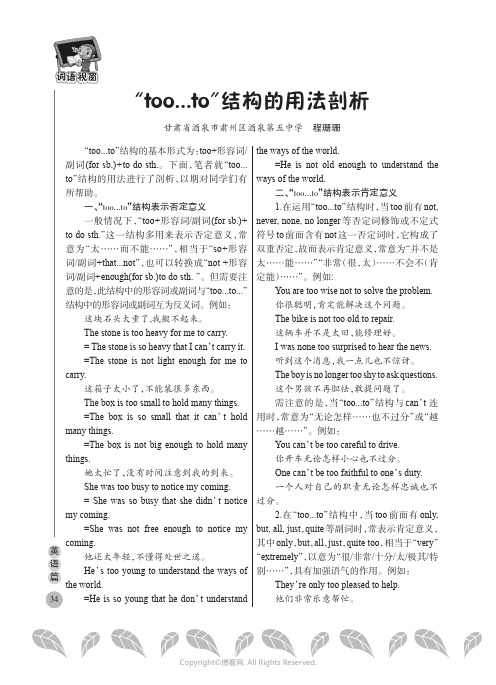
英语篇词语视窗“too...to ”结构的基本形式为:too+形容词/副词(for sb.)+to do sth.。
下面,笔者就“too...to ”结构的用法进行了剖析,以期对同学们有所帮助。
一、“too...to ”结构表示否定意义一般情况下,“too+形容词/副词(for sb.)+to do sth.”这一结构多用来表示否定意义,常意为“太……而不能……”,相当于“so+形容词/副词+that...not ”,也可以转换成“not +形容词/副词+enough(for sb.)to do sth.”。
但需要注意的是,此结构中的形容词或副词与“too...to...”结构中的形容词或副词互为反义词。
例如:这块石头太重了,我搬不起来。
The stone is too heavy for me to carry.=The stone is so heavy that I can ’t carry it.=The stone is not light enough for me to carry.这箱子太小了,不能装很多东西。
The box is too small to hold many things.=The box is so small that it can ’t hold many things.=The box is not big enough to hold many things.她太忙了,没有时间注意到我的到来。
She was too busy to notice my coming.=She was so busy that she didn ’t notice my coming.=She was not free enough to notice my coming.他还太年轻,不懂得处世之道。
He ’s too young to understand the ways of the world.=He is so young that he don ’t understand the ways of the world.=He is not old enough to understand the ways of the world.二、“too...to ”结构表示肯定意义1.在运用“too...to ”结构时,当too 前有not,never,none,no longer 等否定词修饰或不定式符号to 前面含有not 这一否定词时,它构成了双重否定,故而表示肯定意义,常意为“并不是太……能……”“非常(很,太)……不会不(肯定能)……”。
同样的too…to…结构,不同样的含义和用法

同样的too…to…结构,不同样的含义“too+形容词/副词+动词不定式”结构简称为“too...to…”结构,是初中英语中一个十分重要的结构,同时也是中考英语考查的一个十分重要的考点,同学们在学习或复习时应注意以下几点:一、too…to…结构表示否定含义表示否定意义,在翻译时,通常可译为“太……而不能……”、“太……无法……”。
常用的句型有五种。
1.“主语(人)+谓语动词+too+形容词/副词+to do sth.”这个句型是too...to 结构最基本的常用句型。
主语是动词不定式的执行者,too后接形容词或副词原级,有时too后也可跟一个起形容词作用的过去分词,to后接动词原形。
如:The boy is too young to go to school.这男孩年龄太小,不能上学。
He walks too slowly to get there on time.他走得太慢,不能按时到达那儿。
2.“主语(物)+谓语动词+too+形容词/副词+ to do”这个句型也是too...to 结构最基本的常用句型。
主语是动词不定式的承受者,此时用主动式表示被动涵义。
在这个句型中,句子的主语和不定式的宾语是指同一个事物,则宾语不能重复,必须省掉。
如:The hat is too large to wear.这帽子太大,没法戴。
The tea is too hot to drink.茶太热,不能喝3.“主语(物)+谓语动词+too+形容词/副词+ to be done”,这是“too...to”结构中主语是不定式动作的承受者,动词不定式用被动式,后不能带宾语。
如:The tea is too hot to be drunk.茶太热,不能喝。
The shoes are too badly broken to be mended.这些鞋子破烂得不能修补。
4.当句子的主语与动词不定式的逻辑主语不一样时,要用句型“主语+谓语动词+too+形容词/副词+for sb +to do”,在这个句型中,句子主语和不定式的宾语是指同一个事物,则宾语不能重复,必须省掉。
too…to的用法例句

too…to的用法例句too…to…结构的基本形式为“too+形容词或副词+to+动词原形”,其意为“太……以至于不能……”。
如:He is too shy to speak to her.他太害羞,不敢同她讲话。
It's too cheap to be good.这东西太便宜,好不了(即便宜无好货)。
二、不定式的逻辑主语有时不定式前可以带有一个由介词for引出的逻辑主语。
如:It's too expensive for her to buy.太贵了,她买不起。
The box is too heavy for the boy to carry.这个箱子太重,这男孩提不起。
三、不定式是否带宾语在通常情况下,too…to…结构中的不定式可根据其是否及物来确定它是否带宾语。
如:He is too tired to go any further.他太累了,不能再往前走了。
(不定式to go 不及物,无需带宾语)She is too poor to buy such a nice a dress.她太穷,买不起那件漂亮的连衣裙。
(不定式to buy后带有宾语 such a nice a dress)但是,若句子主语与其后不定式有动宾关系,那么,其后的及物动词不定式不能带宾语。
如:The nice dress is too expensive for her to buy. 这件漂亮的连衣裙太贵了,她买不起。
(to buy在此虽为及物动词,但由于句子主语the nice dress与该不定式to buy有动宾关系,故to buy后不宜再接代词it作宾语)注意:若句子主语与其后不定式有动宾关系,且其中的动词为不及物动词,此时应注意在其后加适当的介词。
如:The room is too dirty to live in.这房间太脏,不能住。
(句末的介词in不可省略)四、不定式是否用被动语态上面讲到,若句子主语与其后不定式有动宾关系,其后作为及物动词的不定式不再带宾语。
too…to…结构用法解析

too…to…结构用法解析在“too…to”结构中,整个结构的意思是“太……以致不能……”。
一、基本形式:too+adj. / adv.+to do .其中“to do”修饰“too+adj. / adv.”作为结果状语或程度状语。
“to do”通常包含否定意义。
1. The problem is too hard for a child to understand.(问题太难了,小孩子不能理解。
)2. Examples are too many to cite.(例子太多,举不胜举。
)3. It’s too cold to go in the sea yet.(天太冷,还不能下海。
)4. It’s too long a journey to make in one day.(路程太远,一天之内到不了。
)5. It’s too good an opportunity to miss.(那是一个不应该错过的极好机会。
)6. It’s too early for us to go yet.(我们现在就去太早了点。
)7. It’s too cold to go swimming.(天气太冷,不能去游泳。
)8. He is too much of a coward(too cowardly)to fight.(他太懦弱,不敢抗争。
)9. It’s too late to shut the stable door when the steed is stolen.(贼去关门,为时已晚。
)10. Lying in the pool of blood,she was too week to speak.(她躺在血泊里,虚弱得说不出话来。
)上述例句中,有的主语和不定式有逻辑上的动宾关系(即句子的主语在逻辑上是不定式的宾语),有的则没有这种关系。
如果存在这种动宾关系,句子的不定式用主动语态或被动语态在意义上常无多少差别。
英语语法知识:too……to……的多种用法
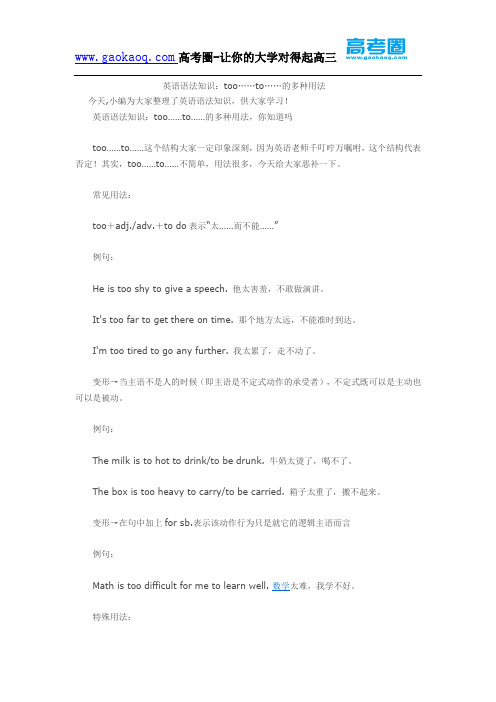
英语语法知识:too……to……的多种用法今天,小编为大家整理了英语语法知识,供大家学习!英语语法知识:too……to……的多种用法,你知道吗too……to……这个结构大家一定印象深刻,因为英语老师千叮咛万嘱咐,这个结构代表否定!其实,too……to……不简单,用法很多,今天给大家恶补一下。
常见用法:too+adj./adv.+to do表示“太……而不能……”例句:He is too shy to give a speech. 他太害羞,不敢做演讲。
It's too far to get there on time. 那个地方太远,不能准时到达。
I'm too tired to go any further. 我太累了,走不动了。
变形→当主语不是人的时候(即主语是不定式动作的承受者),不定式既可以是主动也可以是被动。
例句:The milk is to hot to drink/to be drunk. 牛奶太烫了,喝不了。
The box is too heavy to carry/to be carried. 箱子太重了,搬不起来。
变形→在句中加上for sb.表示该动作行为只是就它的逻辑主语而言例句:Math is too difficult for me to learn well. 数学太难,我学不好。
特殊用法:在下列情况下,"too……to"结构可以表示肯定意义:1."too……to"结构之前带有but, only, all, never, not时,是强调肯定的表示法,译作“非常……”、“十分……”、“实在……”、“真是太……”等。
例句:I'm but too happy to hear that. 得知那个消息我太高兴了。
You are never too late to learn English. 你什么时候学英语都不会晚。
too……to……的结构用法
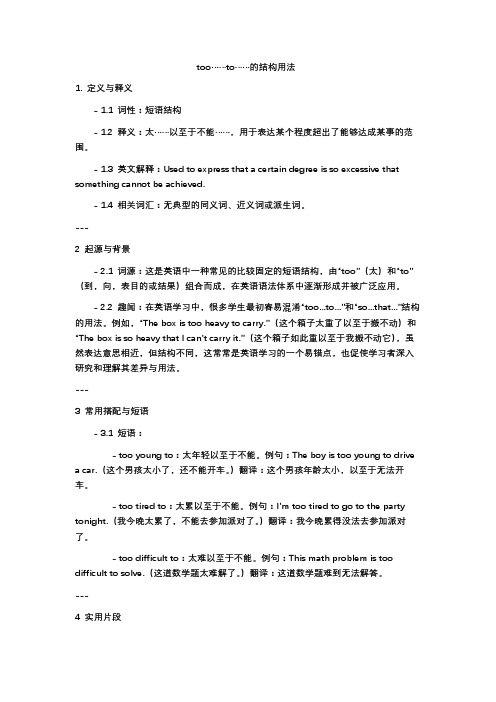
too……to……的结构用法1. 定义与释义- 1.1 词性:短语结构- 1.2 释义:太……以至于不能……,用于表达某个程度超出了能够达成某事的范围。
- 1.3 英文解释:Used to express that a certain degree is so excessive that something cannot be achieved.- 1.4 相关词汇:无典型的同义词、近义词或派生词。
---2 起源与背景- 2.1 词源:这是英语中一种常见的比较固定的短语结构,由“too”(太)和“to”(到,向,表目的或结果)组合而成,在英语语法体系中逐渐形成并被广泛应用。
- 2.2 趣闻:在英语学习中,很多学生最初容易混淆“too...to...”和“so...that...”结构的用法。
例如,“The box is too heavy to carry.”(这个箱子太重了以至于搬不动)和“The box is so heavy that I can't carry it.”(这个箱子如此重以至于我搬不动它),虽然表达意思相近,但结构不同,这常常是英语学习的一个易错点,也促使学习者深入研究和理解其差异与用法。
---3 常用搭配与短语- 3.1 短语:- too young to:太年轻以至于不能。
例句:The boy is too young to drive a car.(这个男孩太小了,还不能开车。
)翻译:这个男孩年龄太小,以至于无法开车。
- too tired to:太累以至于不能。
例句:I'm too tired to go to the party tonight.(我今晚太累了,不能去参加派对了。
)翻译:我今晚累得没法去参加派对了。
- too difficult to:太难以至于不能。
例句:This math problem is too difficult to solve.(这道数学题太难解了。
too…to…句式用法详解
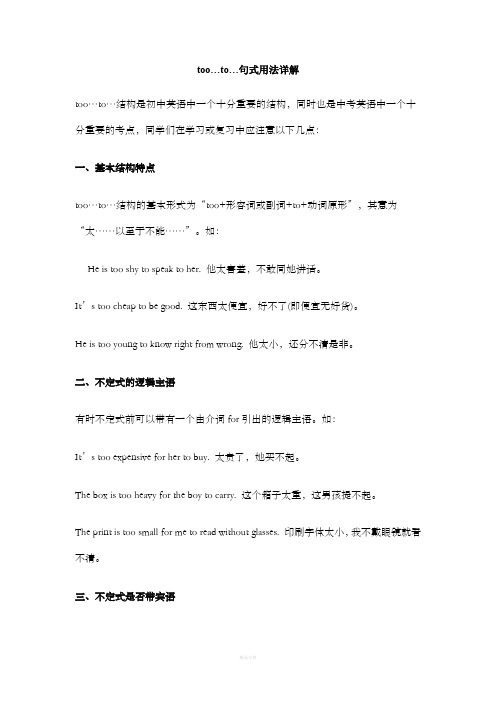
too…to…句式用法详解too…to…结构是初中英语中一个十分重要的结构,同时也是中考英语中一个十分重要的考点,同学们在学习或复习中应注意以下几点:一、基本结构特点too…to…结构的基本形式为“too+形容词或副词+to+动词原形”,其意为“太……以至于不能……”。
如:He is too shy to speak to her. 他太害羞,不敢同她讲话。
It’s too cheap to be good. 这东西太便宜,好不了(即便宜无好货)。
He is too young to know right from wrong. 他太小,还分不清是非。
二、不定式的逻辑主语有时不定式前可以带有一个由介词for引出的逻辑主语。
如:It’s too expensive for her to buy. 太贵了,她买不起。
The box is too heavy for the boy to carry. 这个箱子太重,这男孩提不起。
The print is too small for me to read without glasses. 印刷字体太小,我不戴眼镜就看不清。
三、不定式是否带宾语在通常情况下,too…to…结构中的不定式可根据其是否及物来确定它是否带宾语。
如:He is too tired to go any further. 他太累了,不能再往前走了。
(不定式to go不及物,无需带宾语)She is too poor to buy such a nice a dress. 她太穷,买不起那件漂亮的连衣裙。
(不定式to buy后带有宾语such a nice a dress)但是,若句子主语与其后不定式有动宾关系,那么,其后的及物动词不定式不能带宾语。
如:The nice dress is too expensive for her to buy. 这件漂亮的连衣裙太贵了,她买不起。
(to buy在此虽为及物动词,但由于句子主语the nice dress与该不定式to buy有动宾关系,故to buy后不宜再接代词it作宾语)注意:若句子主语与其后不定式有动宾关系,且其中的动词为不及物动词,此时应注意在其后加适当的介词。
tooto结构的用法

"too+形容词/副词+动词不定式"结构简称为"too、、、to"结构。
这种结构就是英语中常用的一种句型,在大多数情况下表示否定意义,在翻译时,通常可译为"太……而不能……"、"太……无法……"。
下面就谈谈"too、、、to"结构表示否定的常见句型:句型I:too+adj、/adv、+to do这个句型就是too、、、to的最基本的常用句型。
too+形容词或副词,有时too后也可跟一个起形容词作用的过去分词。
例如:The boy is too young to go to school、这男孩年龄太小,不能上学。
The hat is too large to wear、这帽子太大,没法戴。
He walks too slowly to get there on time、她走得太慢,不能按时到达那儿。
I'm too tired to think of anything now、我太累了,什么也不能想了。
句型II:too、、、to+to be V-ed这就是"too、、、to"结构中不定式为被动式时的变体,如果主语就是不定式动作的承受者,不定式既可以用主动式,也可以用被动式,此时用主动式虽然在形式上就是主动的,但在涵义上却就是被动的。
例如:The tea is too hot to drink/to be drunk、茶太热,不能喝。
The molecules are much too small to see/to be seen、分子太小,瞧不见。
The shoes are too badly broken to be mended、这些鞋子破烂得不能修补。
句型III:too+adj、/adv、+forsb、/ sth、to do /be V-ed在"too、、、to"结构中加上一个for sb、/sth、,以提示动词不定式的逻辑主语,可以起到一定的限制作用,即限制不定式所表示的动作行为只就是就它的逻辑主语而言的,对于其她人或物则不一定就是这样,这就使句子意思更具体、明白。
不定式的特殊句型too…to…的用法
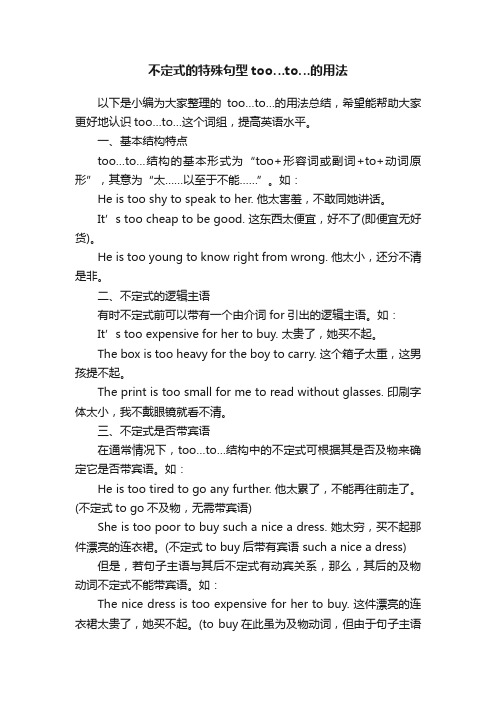
不定式的特殊句型too…to…的用法以下是小编为大家整理的too…to…的用法总结,希望能帮助大家更好地认识too…to…这个词组,提高英语水平。
一、基本结构特点too…to…结构的基本形式为“too+形容词或副词+to+动词原形”,其意为“太……以至于不能……”。
如:He is too shy to speak to her. 他太害羞,不敢同她讲话。
It’s too cheap to be good. 这东西太便宜,好不了(即便宜无好货)。
He is too young to know right from wrong. 他太小,还分不清是非。
二、不定式的逻辑主语有时不定式前可以带有一个由介词for引出的逻辑主语。
如:It’s too expensive for her to buy. 太贵了,她买不起。
The box is too heavy for the boy to carry. 这个箱子太重,这男孩提不起。
The print is too small for me to read without glasses. 印刷字体太小,我不戴眼镜就看不清。
三、不定式是否带宾语在通常情况下,too…to…结构中的不定式可根据其是否及物来确定它是否带宾语。
如:He is too tired to go any further. 他太累了,不能再往前走了。
(不定式to go不及物,无需带宾语)She is too poor to buy such a nice a dress. 她太穷,买不起那件漂亮的连衣裙。
(不定式to buy后带有宾语 such a nice a dress) 但是,若句子主语与其后不定式有动宾关系,那么,其后的及物动词不定式不能带宾语。
如:The nice dress is too expensive for her to buy. 这件漂亮的连衣裙太贵了,她买不起。
(to buy在此虽为及物动词,但由于句子主语the nice dress与该不定式to buy有动宾关系,故to buy后不宜再接代词it作宾语)注意:若句子主语与其后不定式有动宾关系,且其中的动词为不及物动词,此时应注意在其后加适当的介词。
too...to结构的用法
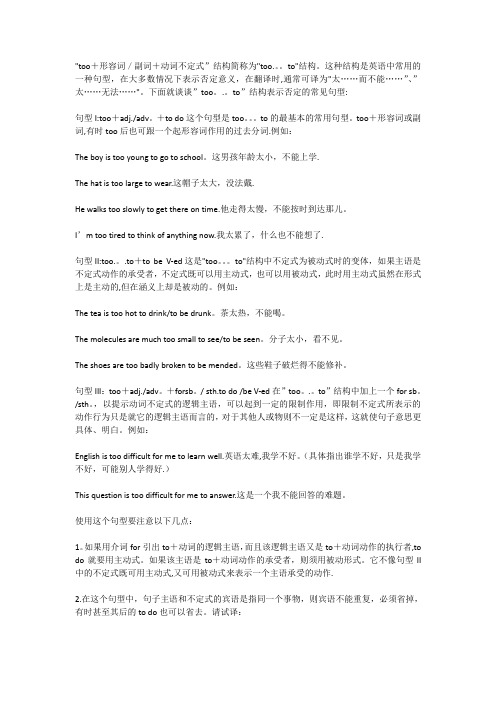
"too+形容词/副词+动词不定式”结构简称为"too.。
to"结构。
这种结构是英语中常用的一种句型,在大多数情况下表示否定意义,在翻译时,通常可译为"太……而不能……”、”太……无法……"。
下面就谈谈”too。
.。
to”结构表示否定的常见句型:句型I:too+adj./adv。
+to do这个句型是too。
to的最基本的常用句型。
too+形容词或副词,有时too后也可跟一个起形容词作用的过去分词.例如:The boy is too young to go to school。
这男孩年龄太小,不能上学.The hat is too large to wear.这帽子太大,没法戴.He walks too slowly to get there on time.他走得太慢,不能按时到达那儿。
I’m too tired to think of anything now.我太累了,什么也不能想了.句型II:too.。
.to+to be V-ed这是"too。
to"结构中不定式为被动式时的变体,如果主语是不定式动作的承受者,不定式既可以用主动式,也可以用被动式,此时用主动式虽然在形式上是主动的,但在涵义上却是被动的。
例如:The tea is too hot to drink/to be drunk。
茶太热,不能喝。
The molecules are much too small to see/to be seen。
分子太小,看不见。
The shoes are too badly broken to be mended。
这些鞋子破烂得不能修补。
句型III:too+adj./adv。
+forsb。
/ sth.to do /be V-ed在”too。
.。
to”结构中加上一个for sb。
/sth。
,以提示动词不定式的逻辑主语,可以起到一定的限制作用,即限制不定式所表示的动作行为只是就它的逻辑主语而言的,对于其他人或物则不一定是这样,这就使句子意思更具体、明白。
高中too和to句式用法详解

高中too和to句式用法详解too和to 这两个用法上有很大区别,千万不要搞混了,以下是给大家整理的高中too和to句式用法详解,希望可以帮到大家too…to…结构是初中英语中一个十分重要的结构,同时也是中考英语中一个十分重要的考点,同学们在学习或复习中应注意以下几点:一、基本结构特点too…to…结构的基本形式为“too+形容词或副词+to+动词原形”,其意为“太……以至于不能……”。
如:He is too shy to speak to her. 他太害羞,不敢同她讲话。
It's too cheap to be good. 这东西太便宜,好不了(即便宜无好货)。
He is too young to know right from wrong. 他太小,还分不清是非。
二、不定式的逻辑主语有时不定式前可以带有一个由介词for引出的逻辑主语。
如:It's too expensive for her to buy. 太贵了,她买不起。
The box is too heavy for the boy to carry. 这个箱子太重,这男孩提不起。
The print is too small for me to read without glasses. 印刷字体太小,我不戴眼镜就看不清。
三、不定式是否带宾语在通常情况下,too…to…结构中的不定式可根据其是否及物来确定它是否带宾语。
如:He is too tired to go any further. 他太累了,不能再往前走了。
(不定式to go不及物,无需带宾语)She is too poor to buy such a nice a dress. 她太穷,买不起那件漂亮的连衣裙。
(不定式to buy后带有宾语 such a nice a dress) 但是,若句子主语与其后不定式有动宾关系,那么,其后的及物动词不定式不能带宾语。
too…to…句式用法详解

too…to…句式用法详解一、基本结构特点too…to…结构,其意为“太……以至于不能……”。
如:He is too shy to speak to her. 他太害羞,不敢同她讲话。
It’s too cheap to be good. 这东西太便宜,好不了(即便宜无好货)。
He is too young to know right from wrong. 他太小,还分不清是非。
二、不定式是否用被动语态The text is too difficult to understand. 这课文太难了,理解不了。
The text is too difficult for the students to understand. 这课文太难了,学生理解不了。
但在某些特殊的语境,其中的不定式必须要用被动式。
如:He spoke in a voice too low to be heard. 他说话的声音太低,听不见。
He is too young to be sent to America for advanced study. 他年轻,不能到美国去深造。
三、too…to…有时可表示肯定意义在以下几种情况,too…to…结构可以表示肯定意义,而不是否定意义:1. 当副词too的前面有否定词修饰时。
如:Never too old to learn. 活到老学到老。
(永远不会太老而不能学习)It’s never too late to stop smoking. 戒烟何时都不算晚。
(永远不会太迟而不能戒烟)2. 当不定式前有否定词修饰时。
比较:He is too foolish to understand this. 他太蠢,不会明白这一点。
He is too clever not to understand this. 他太聪明,不会不明白这一点。
3. 当副词too后面修饰的形容词是glad, ready, pleased等表示“积极”意义的词汇时。
too...to...的用法

too...to...的用法too…to…结构不但可以表示否定的意思,有时还可能有肯定的含义.这里就too…to…的习惯用法归纳如下:一、too…to…通常用来表示否定含义,即“太…而不能…”.例如:1.English is too difficult for Ling Ling to learn.英语对玲玲来讲太难,她学不会.2.His brother is too excited to fall asleep.他哥哥激动得睡不着觉.二、但当too被only, but, all 等词修饰时,too…to…结构就不再表示否定的意思,而有肯定的含义.因为only, but , all+too,表示“实在、非常、十分”等意思.例如:1. I am only too glad to go to the movie with you.我很高兴跟你一起去看电影.2.We are but too glad to follow your advice.我们非常高兴听取你的建议.三、当too 用来修饰ready, kind, eager, apt(易于…的)等词时,too…to…结构也不表示否定.例如:1. It is too kind of you to help me.承蒙帮助,不胜感激.2.The little boys are too ready to play soccer every weekend.每周末这些男孩老是喜欢踢足球.3. Beginners are too apt to make mistakes.初学者容易犯错误.四、too… to…结构还可以有其否定形式,即not (never)too…to… 或too… not to….这时,由于用了双重否定,它就不再表示否定意思,而是表示肯定意思.例如:1. We are never too old to learn.活到老,学到老.2. He is too clever not to see that.他很聪明,不会不懂那件事.补充内容:too+形容词/副词+动词不定式'结构简称为'too...to'结构.这种结构是英语中常用的一种句型,在大多数情况下表示否定意义,在翻译时,通常可译为'太……而不能……'、'太……无法……'.下面就谈谈'too...to'结构表示否定的常见句型:句型I:too+adj./adv.+to do这个句型是too...to的最基本的常用句型.too+形容词或副词,有时too后也可跟一个起形容词作用的过去分词.例如:The boy is too young to go to school.这男孩年龄太小,不能上学.The hat is too large to wear.这帽子太大,没法戴.He walks too slowly to get there on time.他走得太慢,不能按时到达那儿.I'm too tired to think of anything now.我太累了,什么也不能想了.句型II:too...to+to be V-ed这是'too...to'结构中不定式为被动式时的变体,如果主语是不定式动作的承受者,不定式既可以用主动式,也可以用被动式,此时用主动式虽然在形式上是主动的,但在涵义上却是被动的.例如:The tea is too hot to drink/to be drunk.茶太热,不能喝.The molecules are much too small to see/to be seen.分子太小,看不见.The shoes are too badly broken to be mended.这些鞋子破烂得不能修补.句型III:too+adj./adv.+forsb./ sth.to do /be V-ed在'too...to'结构中加上一个for sb./sth.,以提示动词不定式的逻辑主语,可以起到一定的限制作用,即限制不定式所表示的动作行为只是就它的逻辑主语而言的,对于其他人或物则不一定是这样,这就使句子意思更具体、明白.例如:English is too difficult for me to learn well.英语太难,我学不好.(具体指出谁学不好,只是我学不好,可能别人学得好.)This question is too difficult for me to answer.这是一个我不能回答的难题.使用这个句型要注意以下几点:1.如果用介词for引出to+动词的逻辑主语,而且该逻辑主语又是to+动词动作的执行者,to do就要用主动式.如果该主语是to+动词动作的承受者,则须用被动形式.它不像句型II中的不定式既可用主动式,又可用被动式来表示一个主语承受的动作.2.在这个句型中,句子主语和不定式的宾语是指同一个事物,则宾语不能重复,必须省掉,有时甚至其后的to do也可以省去.请试译:①这个箱子太重,我搬不动.误:This box is too heavy for me to carry it.正:This box is too heavy for me to carry.②这辆小汽车太贵,他买不起.误:The car is too expensive for him to buy it.正:The car is too expensive for him(to buy).3.带for sb./sth.的'too...to'结构应是以物为主语,for sb./sth.可以省略,并不会影响句子否定意义的表达.如果原句以人作主语,一般来说就没有必要加不定式的逻辑主语了.例如:It's too late for us to catch the early bus.太晚了,我们赶不上那趟早班公共汽车了.The teacher spoke too fast for us to follow.老师讲话太快,我们听不清楚.句型IV.too+adj.+a(an)+n.+to V./to be V-ed.这个句型在too +adj.后再接一个带不定冠词的名词,不定冠词一定要放置于形容词后.与此同时,只有当too后形容词修饰一个可数名词时,才可以在形容词与名词间加不定冠词'a'.当句子主语能发出该不定式的动作时,可以用to+V.的主动式,当主语是该不定式动作的承受者时,则用to be+V-ed的被动式.例如:He's too experienced an artist to mind what the critics say.(=As an artist he's too experienced to mind what the critics say.)他是个经验非常丰富的艺术家,不会介意批评家说些什么.He is too experienced an artist to be worried by what the critics say.他是一个经验非常丰富的艺术家,不至于为批评家们的议论而担忧.必须特别指出的是,并不是所有'too...to'结构的句子都表示否定意义,在下列情况下,'too...to'结构可以表示肯定意义:1.'too...to'结构之前带有but,only,all,never,not时,是强调肯定的表示法,译作'非常……'、'十分……'、'实在……'、'真是太……'等.例如:I am but too glad to do so.我非常喜欢这样做.We are only too happy to live in China.生活在中国,我们太幸福了.They are all too satisfied to go and do this work.他们很乐意地去做这项工作.You're never too old to enjoy a Christmas stocking.你绝对不会老得不能获得圣诞长袜带来的快乐.English is not too difficult to learn.英语并不难学.2.'too...to'结构中带有表示某种心情或描绘性的形容词或副词,如ready,apt,eager,satisfied,inclined, kind,willing,easy,anxious等加动词不定式结合成一个不可分割的状态、态度、倾向或心情等,并且其后的不定式不是说明too的具体内容,而是修饰形容词,故不定式不再表示结果.例如:Comrade Lei Feng was too ready to help others.雷锋同志乐于助人.The old woman is too apt to forget.这位老太太太健忘了.We are too willing to be scientists.我们太想当科学家了.He is too inclined to be cheated.他很容易上当受骗.He was too anxious to do this job.他非常想干这件工作.She is too hard to deal with.她极难相处.I am too eager to have a world travel.我很想有一次环球旅行.It's too kind of you to tell me that.(=You are very kind to tell me that.)你告诉我那件事真是太好了.3.在'too...to'结构中,不定式为否定式时,是构成的双重否定,其意为'非常(很,太,那么)……不会不(必定能,所以能)……',也不表示否定意义.例如:He is too kind not to help you.他很善良,不会不帮助你.The girl is too careful not to do it well.这姑娘很细心,完全能干好那件事.4.除了上述情况外,还有一种'too...to'结构在翻译上也有它的特殊之处.请试译:The question is too easy(simple)to answer.误:这个问题太容易(简单)了,回答不了.正:这个问题太容易(简单)了,不值得回答.这里按'too...to'结构表示否定意义来译,显然不妥.这里too也是'过于'、'太'的意思,但这个句子可以表达一种特殊的意义,即'太……,不值得……'.再比较:The question is too complicated(difficult)to answer.这个问题太复杂(难)了,不好回答.The question is simple enough to answer.这个问题很简单,容易回答.又如:①The room is too big to hold only afew people.容纳这么几个人,这个房间显然太大了.(意即:容纳这么几个人,不值得用这么大的房间.)比较:This room is too small to hold so many people.这个房间太小了,容纳不了这么多人.This room is big enough to hold so many people.这个房间足够容纳这么多人.②They got there too early to catch the bus.赶公共汽车,他们到那儿有点太早了.(意即:不必去得那么早.)比较:They got there too late to catch the bus.他们去得太晚了,没有赶上公共汽车.They got there early enough to catch the bus.他们早早到了那里,完全可以赶上公共汽车.综上所述,'too...to'结构具有表示否定、肯定两种意义的功能.因此,在遇到'too...to'结构的句子时,必须根据上下文的意思指导学生翻译,在特定的环境中,弄通各种成分之间的内在关系,灵活而具体地处理,才能掌握比较准确的意义,死板地将一些特别的语言现象去套某某公式,难免出现认识上的僵化,理解也常会出错,不能达到灵活掌握和运用英语的教学效果.补充:too…to句型是英语中比较常见的,也是很重要的句型之一.其结构:“too+形容词/副词+to+动词原形”,可译为“太……而不能……”.该句型在形式上是肯定结构,但表达的却是否定意义.其具体用法是:一、由于该句型本身已具有否定意义,因此,不定式前一般不加not.若动词不定式动作的执行者与整个句子的主语不同时指一个人或物时,需要在动词不定式前加上for sb.(动词不定式的逻辑主语),以表明其确切的意义.例如:Jimmy is too young to go to school. 吉米年纪还小,还不能去上学.This question is too hard for me to work out.这道题太难了,我算不出来.That box is too heavy for him to carry. 那箱子太重,他抬不动.二、在too…to…结构中,当to do后面的宾语是句中的主语时,不定式之后的宾语应该省略;如果不定式中的动词为不及物动词时,则应在动词之后再加上适当的介词.例如:The room is too small to live in. 这房子太小,不能居住.三、若too后接ready, please, glad, happy, sad等形容词时,too 相当于very,而too…to…则表达肯定的意义.例如:She is too sad to hear the bad news. 听到不幸的消息她太悲伤了.四、在too…to…结构中,若too前有not, never, nothing等否定词时,此结构也表示肯定意义.例如:He is never too old to learn. 活到老,学到老.五、特别提醒:too…to…句型也可转换成“not…enough to…”结构,但须注意:1)enough前的形容词或副词须是too前面的形容词或副词的反义词;2)enough句型须用否定形式;3)too…to…句型含逻辑主语时,enough句型也要加逻辑主语.例如:The book is too difficult for me to read.=The book isn‘t easy enough。
tooto结构的用法
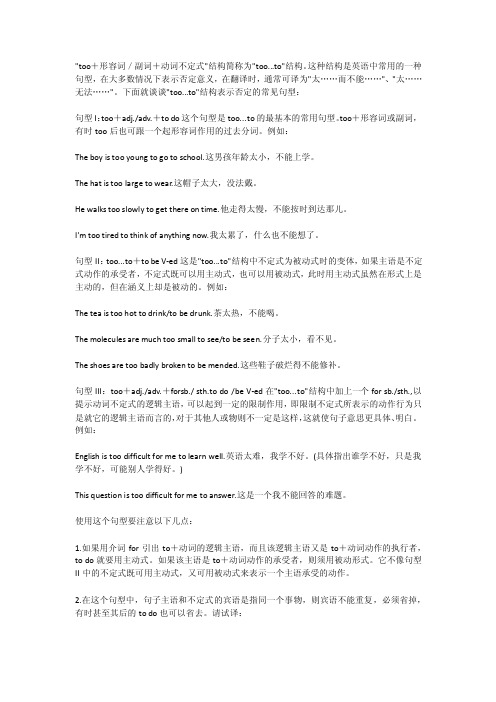
"too+形容词/副词+动词不定式"结构简称为"too...to"结构。
这种结构是英语中常用的一种句型,在大多数情况下表示否定意义,在翻译时,通常可译为"太……而不能……"、"太……无法……"。
下面就谈谈"too...to"结构表示否定的常见句型:句型I:too+adj./adv.+to do这个句型是too...to的最基本的常用句型。
too+形容词或副词,有时too后也可跟一个起形容词作用的过去分词。
例如:The boy is too young to go to school.这男孩年龄太小,不能上学。
The hat is too large to wear.这帽子太大,没法戴。
He walks too slowly to get there on time.他走得太慢,不能按时到达那儿。
I'm too tired to think of anything now.我太累了,什么也不能想了。
句型II:too...to+to be V-ed这是"too...to"结构中不定式为被动式时的变体,如果主语是不定式动作的承受者,不定式既可以用主动式,也可以用被动式,此时用主动式虽然在形式上是主动的,但在涵义上却是被动的。
例如:The tea is too hot to drink/to be drunk.茶太热,不能喝。
The molecules are much too small to see/to be seen.分子太小,看不见。
The shoes are too badly broken to be mended.这些鞋子破烂得不能修补。
句型III:too+adj./adv.+forsb./ sth.to do /be V-ed在"too...to"结构中加上一个for sb./sth.,以提示动词不定式的逻辑主语,可以起到一定的限制作用,即限制不定式所表示的动作行为只是就它的逻辑主语而言的,对于其他人或物则不一定是这样,这就使句子意思更具体、明白。
too…to…句式的用法
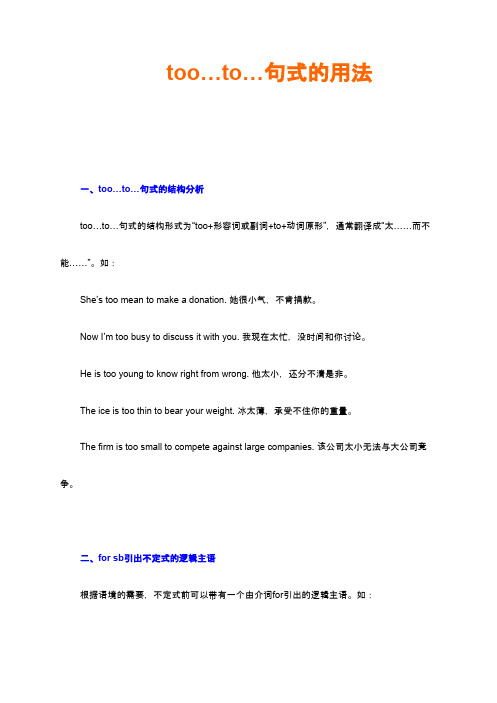
too…to…句式的用法一、too…to…句式的结构分析too…to…句式的结构形式为“too+形容词或副词+to+动词原形”,通常翻译成“太……而不能……”。
如:She’s too mean to make a donation. 她很小气,不肯捐款。
Now I’m too busy to discuss it with you. 我现在太忙,没时间和你讨论。
He is too young to know right from wrong. 他太小,还分不清是非。
The ice is too thin to bear your weight. 冰太薄,承受不住你的重量。
The firm is too small to compete against large companies. 该公司太小无法与大公司竞争。
二、for sb引出不定式的逻辑主语根据语境的需要,不定式前可以带有一个由介词for引出的逻辑主语。
如:给大家推荐一个英语微信群-Empty Your Cup英语微信群是目前学习英语最有效的方法,群里都是说英语,没有半个中文,而且规则非常严格,是一个超级不错的英语学习环境,群里有好多英语超好的超牛逼的人,还有鬼佬和外国美眉。
其实坦白说,如果自己一个人学习英语太孤独,太寂寞,没有办法坚持,好几次都会半途而废。
只要你加入到那个群里以后,自己就会每天都能在群里坚持学,坚持不停地说和练,由于是付费群,群里的成员学习氛围非常强,每天的训练度都非常猛,本来很懒惰的你一下子就被感染了,不由自主地被带动起来参与操练,不好意思偷懒,别人的刻苦学习精神会不知不觉影响你,Empty Your Cup英语微信群(进群加喂新 601332975)可以彻底治好你的拖延症,里面学员都非常友好,总是给你不断的帮助和鼓励,让你在学英语的路上重新燃起了斗志,因为每天都在运用,你的英语口语就能得到了迅猛的提升,现在可以随便给一个话题,都能用英文滔滔不绝的发表5分钟以上对这个话题的看法和观点,想提高英语口语的 可以加入进来,It really works very well.He’s too old for you to marry. 他比你大得多,你不宜嫁给他。
- 1、下载文档前请自行甄别文档内容的完整性,平台不提供额外的编辑、内容补充、找答案等附加服务。
- 2、"仅部分预览"的文档,不可在线预览部分如存在完整性等问题,可反馈申请退款(可完整预览的文档不适用该条件!)。
- 3、如文档侵犯您的权益,请联系客服反馈,我们会尽快为您处理(人工客服工作时间:9:00-18:30)。
too…to…结构用法解析在“too…to”结构中,整个结构的意思就是“太……以致不能……”。
一、基本形式:too+adj、/ adv、+to do 、其中“to do”修饰“too+adj、/ adv、”作为结果状语或程度状语。
“to do”通常包含否定意义。
1、The problem is too hard for a child to understand、(问题太难了,小孩子不能理解。
)2、Examples are too many to cite、(例子太多,举不胜举。
)3、It’s too cold to go in the sea yet、(天太冷,还不能下海。
)4、It’s too long a journey to make in one day、(路程太远,一天之内到不了。
)5、It’s too good an opportunity to miss、(那就是一个不应该错过的极好机会。
)6、It’s too early for us to go yet、(我们现在就去太早了点。
)7、It’s too cold to go swimming、(天气太冷,不能去游泳。
)8、He is too much of a coward(too cowardly) to fight、(她太懦弱,不敢抗争。
)9、It’s too late to shut the stable door when the steed is stolen、(贼去关门,为时已晚。
)10、Lying in the pool of blood,she was too week to speak、(她躺在血泊里,虚弱得说不出话来。
) 上述例句中,有的主语与不定式有逻辑上的动宾关系(即句子的主语在逻辑上就是不定式的宾语),有的则没有这种关系。
如果存在这种动宾关系,句子的不定式用主动语态或被动语态在意义上常无多少差别。
当然,如果不定式采用被动语态,这种逻辑上的动宾关系就变成了逻辑上的主谓关系了。
1、Atoms are too small to see(or be seen)with naked eyes、(原子太小,肉眼瞧不见。
)2、It’s too hot to eat(or to be eaten)、(太烫了,没法吃。
)3、The light is too dim to be used for close work、(这灯太暗,不能用来做细活。
)4、That was too complicated to be expressed clearly inone or tow words、(那太复杂了,无法用一、两句话表达清楚。
)那究竟什么情况下用主动语态,什么情况下用被动语态呢?一般来说,哪种形式表意更清楚、更自然、更符合习惯,则取哪种形式。
1、Novels in the original are too difficult to read、(主动语态)(原版小说太难读了。
)2、At that time he was too far away to be seen、(被动语态)(那时,她离得太远,瞧不到她。
)以上这两个例句中的语态调换一下,则会引起意思不清或不自然。
二、当“too…to”结构之前加了not,only,but,all,never等词时,“too…to”结构构成的句子也无否定意义。
此时too后的形容词多为表示心情的形容词。
因为,在此情况下,这些词加too 在意义上相当于very。
1、One is never too old to learn、(活到老,学到老。
)2、Swimming is not too difficult to learn、(游泳并不十分难学。
)3、We are only too pleased to go with her、(我们非常乐意与她一起去。
)4、Mary knew but too well to hold her tongue on that occasion、(玛丽深知在那种场合少说为妙。
)5、It’s never too late to mend、(亡羊补牢,犹未为晚。
)6、They are all too satisfied to follow others suit without the pain of thought for themselves、(她们十分满足于依样画葫芦,自己不肯花力气、动脑筋。
)上面所提到的这些词只能与某些形容词或副词连用,用在“too…to”结构中,不能生搬硬套句型。
如下面例句:He is too cruel to sympathy for others、(她太残忍了,对人不会有同情心。
)此例句中,在too cruel 之前不能添加only,but 之类的词,否则会引起逻辑上的自相矛盾。
He is only too lazy to do it himself、(她太懒了,哪会自己去干那种事。
)其中的only也属误用,应该去掉。
由此可见,能否在too 之前加上诸如only,but 等词,关键就是too 之后的形容词的意义。
常用的形容词有glad,pleased,willing,thankful,good,true等等。
1、At another time I learned that no matter was too small to escape the Prime Minister’s attention、(另一次,我发现,事无巨细,总理事事关心。
)2、He was an all-round genius、Nothing was too difficult for him to learn、(她多才多艺,没有她学不会的东西。
)3、The question was so easy、Noone in the world was too foolish to answer it、(这个问题如此容易,不至于有谁蠢得答不上来。
)三、此结构与ready,anxious,inclined,apt,easy,eager,willing,happy 这一类词连用时,也不再含有否定意义。
too不再只与to do 发生关系,而就是修饰too 之后的整个部分了。
1、The old women was too ready to talk、(那位老妇人太饶舌。
)2、He is too ready to find fault、(她最喜欢挑毛病。
)2、The tradesman was too anxious to sell his pens、(这位买卖人十分急于卖掉她的钢笔。
)4、He was too willing to accept Mary’s invitation、(玛丽的邀请她求之不得。
)5、Beginners are too apt to make mistakes here、(初学者特别容易在这儿搞错。
)从这些例句中,我们不难发现,too 不仅没有使句子产生否定意义,相反,它还起了某种强调作用,使之成为一种加强语气的结构。
这在教学中要引起注意。
四、在“too…to”结构中,to do前用not加以否定。
“too…to”结构通常已含有否定意义,在其中加上not后便形成了“双重否定为肯定”。
这样,“too…not to do”所表达的意思就就是:“如此……就是会……”,或“如此……哪能不……”。
1、He was too angry not to criticize her、(她太生气了,哪能不批评她。
)2、The poem is far too beautiful not to be requited here、(这首诗太美了,这里还要引用一下。
)3、His experience there was too bitter not to be remembered、(她在那里的经历太惨了,不容她记不得。
)4、Mr、Holmes was too wise not to see the tricks of the criminals、(福尔摩斯先生如此精明,岂能瞧不出罪犯玩弄的花招。
)5、Tom is too hard-working not to pass the exam、(汤姆这么用功,哪有考不及格的道理。
)6、He read too many books about Africa not to known something about the social customs there、(她读了那么多有关非洲的书,不会不对哪儿的社会习俗有所了解。
)五、“Too…to”与“enough to”与“so…that”的区别:“too…to”结构与“enough to”与“so…that”,它们间有共同点,也有不同点。
1、共同点:A、它们都可做结果状语或程度状语。
1)A train was coming near quickly,and the boy was too frightened to move、(一列火车快速驶近,那个男孩子吓得不敢动了。
)2)When we talk about the universe,we mean notonly the earth,the sun,the moon and the stars,but also all the things too far away to see、(当我们谈到宇宙时,指的不仅就是地球、太阳、月亮与星星,还有那些遥远的瞧不见的一切。
)3)At the end of six months he had learned enough to read articles and reports in Russian、(六个月她学习得能瞧俄文版的文章与报道了。
)4)Is the ice hard enough to skate on?(在冰上滑冰,冰硬不硬?)5)In fact,his English inone of these articles was so good that Engels wrote him a letter and praised him for it、(事实上,从马克思的其中一篇文章中可以瞧出,她的水平就是很好的,从此,恩格斯给她写信表扬了她。
)6)He had mastered the language so well that he was able to write the book in English、(她对英语掌握得很不错,能用它写这本书了。
)B、它们之间可以相互转换,其意义不变。
1)“too…to”结构与“enough to”结构相互转换,要改用反义的形容词。
